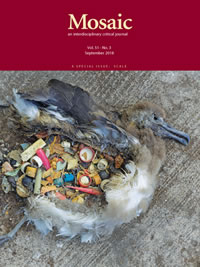Issue 51.3
Overview

Special Issue: Scale
Published: September 2018
View the issue introduction or see the issue summary and contents below.
12 essays, totalling 230 pages
$24.95 CAD
Within the biological-ecological sciences from which the term Anthropocene emerged, “scale” has a longer history and broader usage than it does within the now-proliferating philosophical, critical, theoretical, and ethical discourses that address environmentalism, climate change, and the Anthropocene’s status as a sixth major extinction event. For the latter discourses, scale often refers to something “bigger” than we have ever previously encountered: climate change, for instance, as a crisis unprecedented in its scope and in the reorientation, or “reinvention,” of critical protocols that it is said to require. Given the unrelenting scale of such issues as climate change and of factors contributing to it, e.g., the shift from small-scale family farming to massive global-marketing industrial operations, must theory, too, as some suggest, undergo a transition from local and individual to global perspectives? In what might a global imaginary consist, and how might it relate to existing critiques of globalization as but a label for the hegemony of Western culture? Are broader understandings of scale available from within the ecological sciences and, if so, how might these serve as resources for the “greening of theory”?
The Scale of the Anthropocene: Material Ecocritical ReflectionsSerpil Oppermann This essay considers the messy intra-actions of the Anthropocene agencies using the lenses of material ecocriticism. | |
From Suspect to Species: Climate Crime in Antti Tuomainen’s | |
Hollow Ecology and Anthropocene Scales of MeasurementSimon C. Estok The scales of measurement implied in the term “Anthropocene” are problematical and are not equal to meeting the increasing urgency about environmental impacts of human activities. The felt need for action requires an adjustment of global values and ethics and a deep analysis of the scale issues that the term “Anthropocene” itself poses. | |
Subalternity and Scale in Arundhati Roy’s The God of Small ThingsJane Poyner Reading subaltern agency in The God of Small Things according to environmentalist notions of “scale” produces more complex and potentially more empowering refractions of subalternity than straightforwardly Marxist or postcolonial studies have afforded. I argue Velutha is both oppressed subaltern and prototypical eco-warrior of a new planetary order. | |
Infinitesimal Poetics of the Sedimented Ground: The Pantanal in Manoel de BarrosAxel Pérez Trujillo Diniz This essay explores Brazilian poet Manoel de Barros’s disruption of mimetic representations of nature through the use of naming. His poetics concentrates on naming things found in the Pantanal wet plains, scaling down his gaze so as to emphasize the flora and fauna that populates the region. | |
Seeing the Nation for the Trees: Nature and Nationalism in the Novela de la selvaLaura Hunt This essay examines two of the Latin American novelas de la selva, or “jungle novels,” Macunaíma by Mario de Andrade and La serpiente de oro by Ciro Alegría, demonstrating how representations of Amazonian nature were utilized as part of nationalist discourse in the era following Independence. | |
Protecting the Fragile Splendor of the Universe: A Serresian Reading of Jean Giono’s L’Homme qui plantait des arbresKeith Moser This essay presents an ecocritical reading of Jean Giono’s narrative L’homme qui plantait des arbres. Delving into the complex philosophy of Michel Serres, this investigation explores Giono and Serres’s efforts to foster a dialogue about the most pressing subject confronting the human race at the dawn of the Anthropocene epoch. | |
Plastic in the Pacific: Midway Atoll, Plastiglomerate, and Love of PlaceChristina Gerhardt This essay examines plastic in the Pacific via Chris Jordan’s Midway: Message from the Gyre photographs and the concept "plastiglomerates," proposed by geologist Patricia L. Corcoran, artist Kelly Jazvac, and oceanographerCharles J. Moore. It also rethinks the Anthropocene through models that work against colonialist and imperialist legacies and toward economic and social justice. | |
Nuclear Hegemony and Material Indices: The Satirical Verse Boom in Daily Newspapers after FukushimaDean Anthony Brink Following Alain Badiou’s modeling of change in relation to events, this study engages New Materialist issues of human-nonhuman relations and ontologies so as to situate satirical poetry appearing in Japanese daily newspapers and tweets after the Fukushima Nuclear Disaster as challenges to government and media obfuscation, thus broadening roles for creative writing in ecocriticism. | |
Sincerity, Selfishness, and Comedic TimingDale Tracy Two stand-up specials produce a structurally elicited sincerity through the comedic timing of the call-back joke and a slow-burning anger. This slow timing valuably addresses selfishness and the long temporality of environmental crisis, particularly as comedy presents an alternative to tragedy. | |
Subjectal Scale and Micro-biopolitics at the End of the Anthropocene: Margaret Atwood’s MaddAddam TrilogyChien-Hung Chen With the Anthropocene coming to a close in Margaret Atwood’s MaddAddam trilogy, survivors of Crake’s Paradice project scrape along in the pleeblands, attesting to a shift from a macroscopic timescale to a micro-political subjectal scale. The milieu they trudge is a ustopian fictional universe characterized by circularity, hermeticity, stagnation, and ecstasy. | |
The Evolutionary Sublime: Deep Time and the Historical Novel in Joan Thomas’s CuriosityCynthia Sugars Joan Thomas’s novel Curiosity focusses on the period when fossil discoveries were overturning conceptions about humanity’s place in history. It considers how early evolutionary theory positioned subjects vis-à-vis questions of historicity and scale. Yet the concept of deep time disallows the continuum between past and present on which the historical novel insists. Curiosity embodies this paradox through its focus on the incommensurability of human history and deep time. |